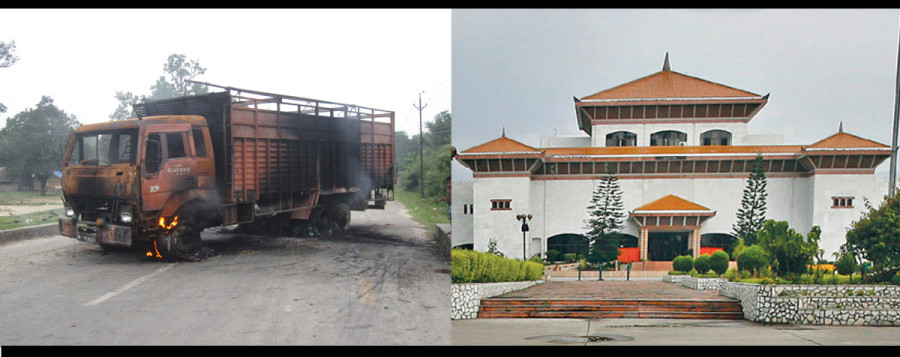Miscellaneous
SPECIAL EDITORIAL: As Tarai burns, parties could at least put CA process on hold
We still believe it is not too late for the parties to sit down for talks and iron out their differences
It has been a month since the Tarai unrest started. Two dozen protesters have died since—four of them most recently in Mahottari.
It was Kailali that first saw the brutal killings of eight police personnel. Increasingly, there have been other incidents where inflamed agitators decided to take on the security forces, including in Biratnagar.
In order to quell protests, the Army has been deployed in several flashpoints, including in Kailaili and adjoining villages, where correspondents from the Post were first-hand witnesses to a tense standoff between Tharu and Pahade communities.
The early conjecture in some quarters that the violence would remain largely localised in the Tharu heartland in far-western Tarai has now been debunked.
From Tikapur to Gaur and Bharadah to Biratnagar, the unrest has clearly spread across the country in a month—from western Tarai, with a sizeable Tharu population, to eastern Tarai, with a big Madhesi population. But it would be a mistake to see it purely as a Pahade-Madhesi/Tharu issue, as a number of senior leaders across party lines are now insisting that the Tarai unrest be resolved through a political solution, not a hard-handed security approach.
In that respect, the political parties’ call on Wednesday inviting the agitating parties, representing Tharu and Madhesi communities for talks, seems to have done little to motivate them to accept the offer. Unless the call if backed up by serious political overtures, the Tharu-Madhes constituencies are likely to feel further alienated and even infuriated.
It would be a blunder to ignore the ominous rumbles in the Tarai now. It would be far wiser to address the concerns early.
The government and the three major parties—the NC, CPN-UML and UCPN (Maoist) seem adamant on sticking to the current and mutually agreed upon CA calendar to promulgate the new constitution. They could be greatly miscalculating the anger simmering in the Tarai. This could further incense Dalits, Janajatis, women and other minority groups who are asking the government to first address their concerns before promulgating the constitution. They must be engaged with utmost sincerity.
What lies at the core of their discontent is simple enough: if grievances of one community could be heard, why can’t that of others’? We have argued that in order for the constitution to gain legitimacy, it needs to be owned by a broad section of the Nepali population.
The parties committed a historic blunder in deciding to selectively review a six-province model to placate a constituency that stood firmly in favour of Akhanda Sudurpaschim, an undivided Far West. It is no secret that all three major parties have powerful leaders from the region—Sher Bahadur Deuba (NC), CPN-UML (Bhim Rawal), Lekhraj Bhatta (UCPN-Maoist).
And now, the Tharu-Madhes demands seem to be hardening. The core four demands are: a) form a fact-finding body to investigate deaths in the current Tarai unrest; b) initiate discussions on the post 2006/2007 political accords; c) withdraw the Army units deployed in Tarai districts; d) put the CA process on hold for now to placate the agitators who believe that the parties want to ‘bulldoze’ the constitution.
The major parties have displayed poor political acumen. Instead of reaching out to the Madhesi-Tharu constituencies, they have issued unhelpful diatribes pandering to a certain community.
It could cost the nation dearly.
Already, increasing numbers of CA members in the Nepali Congress, and not just from the Tharu-Madhesi communities, are asking the top leaders to review their current position on the constitution. Senior leaders like Shekhar Koirala are now calling on the party leadership to review its position on the Tarai.
The UCPN (Maoist)’s position has been confusing in this regard. As a party, it is a signatory to the 16-point agreement expediting the CA process. It perhaps reckons that federalism and the republican agenda they introduced into the political mainstream after the 2006 Jana Andolan would be lost if the NC-UML constituencies hardened their position any further. This dilemma is best reflected in former Prime Minister Baburam Bhattarai’s numerous Tweet posts: he never fails to support the call for minority rights while his party institutionally stands in favour of expediting the CA process.
Even among the three parties’ insular approach to dealing with minority demands, the UML’s position remains the hardest. Party Chairman KP Oli believes that “a few mangoes are bound to fall from the tree,” in reference to minority groups/parties’ opposition to the constitution draft and the CA process. Pradeep Gyawali, a UML leader, has said that he is not sure what the Madhesi demands are.
We still believe it is not too late for the parties to sit down for talks and iron out their differences. Towards that end, there has been suggestions from one of the three major parties to put the CA process on hold to allow the political negotiations to begin. We urge the parties to heed the call. Doing so will at least allow political elbow room for other helpful manoeuvres.




 9.12°C Kathmandu
9.12°C Kathmandu









